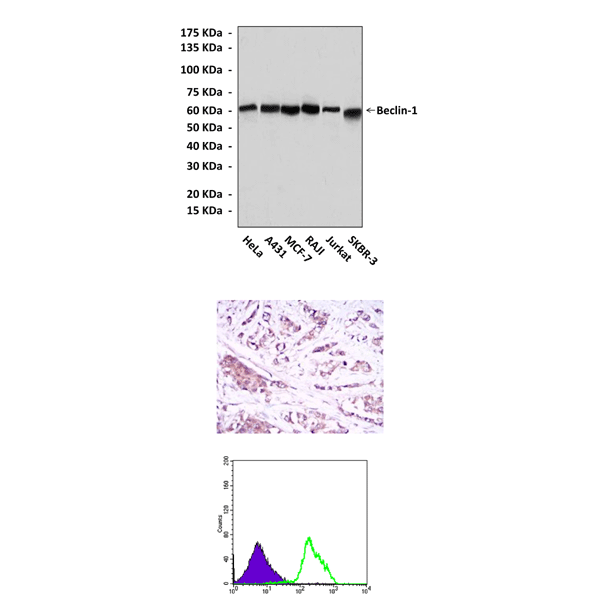Anti-Beclin-1: Mouse Beclin-1 Antibody |
 |
BACKGROUND Beclin 1, the mammalian orthologue of yeast Atg6, has a central role in autophagy, a process of programmed cell survival, which is increased during periods of cell stress and extinguished during the cell cycle. Human Beclin 1 shares 24.4% amino-acid identity with Atg6, and it is mapped to a tumor susceptibility locus on chromosome 17q21. The Beclin 1 gene encodes a 60-kDa coiled-coil protein that is widely expressed in human normal adult tissues and interacts with the prototypic apoptosis inhibitor Bcl-2. It has been found that Beclin 1 has a BH3-only domain (amino acids 114-123), a central coiled-coil domain (CCD, amino acids 144-269), and an evolutionarily conserved domain (ECD, amino acids 244-337) by sequence and structural studies. BH3 proteins are necessary and sufficient for its interaction with Bcl-XL and they are pro-apoptotic damage sensors that play an important role in protecting against cancer.1 Mutation of the BH3 domain of Beclin 1 or of the BH3 receptor domain of Bcl-XL abolishes the Bcl-XL-mediated inhibition of autophagy triggered by Beclin 1. This interaction can also be disrupted by phosphorylation of Bcl-2 and Beclin 1, or ubiquitination of Beclin 1. Moreover, the pharmacological BH3 mimetic ABT737 competitively inhibits the interaction between Beclin 1 and Bcl-2/Bcl-XL, antagonizes autophagy inhibition by Bcl-2/Bcl-XL and hence stimulates autophagy. In contrast, it interacts with several cofactors (Atg14L, UVRAG, Bif-1, Rubicon, Ambra1, HMGB1, nPIST, VMP1, SLAM, IP3R, PINK and Aurvivin) to regulate the lipid kinase Vps-34 protein and promote formation of Beclin 1-Vps34-Vps15 core complexes, thereby inducing autophagy. Interestingly, caspase-mediated cleavage of Beclin 1 promotes crosstalk between apoptosis and autophagy. In addition, UVRAG, a tumor-suppressor candidate that is monoallelically mutated at high frequency in human colon cancers, interacts with the CCD of Beclin 1 through its own central CCD.2 One study shows Beclin 1-deleted ECD is unable to enhance starvation-induced autophagy, and it lacks tumor-suppressor function in mouse model, which reveals the ECD of Beclin 1 is essential for autophagy and the tumor-suppressor function.
Growing evidence indicates that Beclin 1 protein might act as a regulator of the selective turnover of proteins involved in the control of cell growth and proliferation; moreover, Beclin 1-regulated autophagy relates closely to several human diseases. For instance, autophagy can be stimulated by myocardial ischemia, and during reperfusion it is accompanied by upregulation of Beclin 1. In addition, autophagy has been documented in several neurodegenerative diseases, and the elevation of Beclin 1 at the site of injury may represent enhanced autophagy as a mechanism to discard injured cells and reduce damage to cells by disposing of injured components. Another study demonstrated that NPC1 gene deficiency results in increased basal autophagy in human fibroblasts through increased expression of Beclin 1. Increased Beclin 1 levels and elevated autophagy are also observed in other sphingolipid storage diseases characterized by disrupted cholesterol and sphingolipid trafficking. The HSV1-encoded neurovirulence protein ICP34.5 binds to Beclin 1 and inhibits its autophagy function,] suggesting that endogenous amounts of Beclin 1 are important in protecting against viral invasion. Additional evidence shows that ceramide can control autophagy, and that it may be involved in the tamoxifen-dependent increase in Beclin 1 levels. It has been reported that reduced levels of Beclin 1 expression and mono-allelic deletion were observed in human breast cancer cell lines and tissues.3
Growing evidence indicates that Beclin 1 protein might act as a regulator of the selective turnover of proteins involved in the control of cell growth and proliferation; moreover, Beclin 1-regulated autophagy relates closely to several human diseases. For instance, autophagy can be stimulated by myocardial ischemia, and during reperfusion it is accompanied by upregulation of Beclin 1. In addition, autophagy has been documented in several neurodegenerative diseases, and the elevation of Beclin 1 at the site of injury may represent enhanced autophagy as a mechanism to discard injured cells and reduce damage to cells by disposing of injured components. Another study demonstrated that NPC1 gene deficiency results in increased basal autophagy in human fibroblasts through increased expression of Beclin 1. Increased Beclin 1 levels and elevated autophagy are also observed in other sphingolipid storage diseases characterized by disrupted cholesterol and sphingolipid trafficking. The HSV1-encoded neurovirulence protein ICP34.5 binds to Beclin 1 and inhibits its autophagy function,] suggesting that endogenous amounts of Beclin 1 are important in protecting against viral invasion. Additional evidence shows that ceramide can control autophagy, and that it may be involved in the tamoxifen-dependent increase in Beclin 1 levels. It has been reported that reduced levels of Beclin 1 expression and mono-allelic deletion were observed in human breast cancer cell lines and tissues.3
REFERENCES
1. Yue, Z. et al: Proc. Natl. Acad. Sci. USA 100:15077-82, 2003
2. Itakura, E. et al: Mol. Biol. Cell 19:5360-72, 2008
3. Kang, R. et al: Cell Death Diff. 18:571-80, 2011
2. Itakura, E. et al: Mol. Biol. Cell 19:5360-72, 2008
3. Kang, R. et al: Cell Death Diff. 18:571-80, 2011
Products are for research use only. They are not intended for human, animal, or diagnostic applications.
Параметры
Cat.No.: | CP10367 |
Antigen: | Raised against purified recombinant fragments of human Beclin-1 expressed in E. Coli. |
Isotype: | Mouse IgG1 |
Species & predicted species cross- reactivity ( ): | Human |
Applications & Suggested starting dilutions:* | WB 1:1000 IP n/d IHC 1:50 - 1:200 ICC n/d FACS 1:50 - 1:200 |
Predicted Molecular Weight of protein: | 60 kDa |
Specificity/Sensitivity: | Detects Beclin-1 proteins without cross-reactivity with other family members. |
Storage: | Store at -20°C, 4°C for frequent use. Avoid repeated freeze-thaw cycles. |
*Optimal working dilutions must be determined by end user.
Документы
Информация представлена исключительно в ознакомительных целях и ни при каких условиях не является публичной офертой








